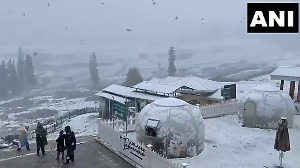It was a different Chief Minister Narendra Modi who walked through the terror-shadowed bylanes of Surat on Wednesday. Battered by a series of blasts in Ahmedabad and the discovery of several bombs in Surat, the Gujarat chief minister was without his usual boasts, promises of security and jibes at political opponents. He was, obviously, ruffled by the grim turn of events.
Everyone -- the chief minister, his followers, and their opponents -- in Gujarat is shell-shocked by the extent and depth terrorism's tentacles have reached in the state. Even if no one has been killed in Surat, shock and fear of the unknown are playing upon people's minds.
It all started at 11 am on Sunday when a live bomb was detected outside the Nupur hospital on Satellite Road. The diamond city since then had seen 21 bombs -- all defused -- being discovered.
Lallubhai Patel, a Surat Municipal Corporation worker, found a package while cleaning up Satellite Road on Saturday. He took it home, thinking that it was a cassette player, and forgot all about it. The next morning, he saw the reports in Sunday's newspapers about the Ahmedabad blasts, got scared, and promptly threw away the parcel near the hospital from where he had picked it up.
Patel told rediff.com, "I am innocent. I thought I had found some discarded gift and took it home. I slept at home with the package. Next day, when people talked about unexploded bombs and tiffin boxes, I got scared. Since then I have been having sleepless nights. I still can't imagine how I slept with a bomb in my house."
Later, he informed the police.
A few hours after this, at 2 pm, the police found the WagonR loaded with ammonium nitrate used to make bombs. Wasting no further time Police Commissioner RMS Brar called a press conference to announce the findings and to request the public to stay indoors. 'Don't crowd public places,' was his instruction. Heeding his words, immediately cinema houses, malls and restaurants closed for the day.
For the 'cleanest city in India', it was a new beginning and a wake-up call.
People did stay indoors and watched in horror the images of bombs being defused on TV from every nook and corner of the city. Even from a treetop.
On Varacha road a car was found carrying four live bombs and 20 kg explosives. The police also found knives, packets of nuts and bolts, petrol, chemicals, detonators, timer devices and gelatin sticks. It was clear that everything had been assembled to kill/maim the maximum mumber and do the worst damage possible. What followed was panic. The markets were closed; employees ran away from offices; lawyers ran home leaving cases mid-way.
The police claimed that the raw materials found was enough to make 50 bombs. Surat had been sitting on bombs, literally, it seems.
Leaders of the diamond markets and textiles markets met and decided to down the shutters by 7pm. Out of the city's four million population, more than 40 per cent is linked to the diamond and textiles trade. By way of security and safety, factory-owners gave token numbers to workers who ride bicycles, and had all unused vehicles on their premises disposed of.
Surat is one of the busiest cities of India, with an annual turnover of Rs 70,000 crore from the diamond industry and Rs 65,000 crore from textiles.
Sunday and Monday were unforgettable for Surtis because the panic affected everyone. Everyone was the victim, and the aggressor was unknown, unseen. This led many Surtis to believe that their attention was being diverted before the actual blasts.
Surat had witnessed social tension before, in the aftermath of the Babri masjid demolition in December 1992 and during the 2002 Gujarat riots. But finding so many bombs brought about a feeling of mystery combined with fear.
To understand this, one must know Surat.
There are two Surats on the banks of the Tapi river.
The original Surtis comprise Ghnachi, Khatris, Baniyas and Ranas. They are known for their fun-loving nature, craze for food, and colourful language.
South Gujarat is known for its secular outlook, even after the rise of Hindutva in the state, and gives sizeable votes to the Congress. But today original Surtis are in a minority in Surat, having been overwhelmed by migrants from Saurashtra who dominate the diamond trade. The migrants are quite saffronised, and many of them are neo-rich who flash their new wealth. This crowd lives around Varacha road, Ved road and Katar village, which areas are since long known as communally sensitive.
Surat has around five lakh Muslims who are a prominent part of the landscape. Not only do they claim to have equal economic opportunities, their educational institutions are also flourishing. Even as the bombs were being found, one of the Muslim leaders, Salimbhai Ghadiyali, told rediff.com, "Just one month ago we had organised a huge meeting against terrorism. We appeal to everybody to cooperate and help find the bombs or anyone moving suspiciously."
S M Darjee, deputy director of the forensic laboratory, said the bombs did not explode as they did not have timer devices. They were similar, he said, to the bombs that were found unexploded in Ahmedabad.
These bombs had integrated electronic chips that didn't work as planned. One can imagine the level of horror and destruction that would have been wrough had they gone as scheduled.
And finding so many bombs will not be taken lightly by voters who had put their full trust in the chief minister's ability to provide security.
Kirti Jain, a trader, said, "Modi's Unique Selling Point was his capacity to provide security. The limitations of his political and administrative talent have been exposed. He cannot boast anymore that his state is safe. We laugh at Home Minister Shivraj Patil and his appeal for calm. We have no faith in our leaders because we find them impotent. We are helpless and left to the mercy of god."





